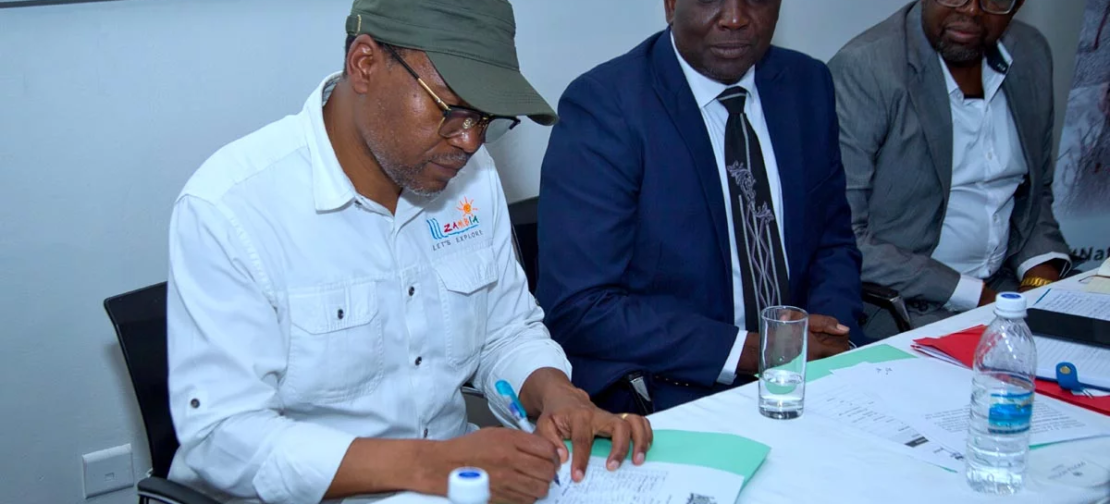- Choma Southern Province
- (260) 97 711 140

The Department of National Parks and Wildlife (DNPW) in collaboration with the Barotse Royal Establishment (BRE), Peace Parks Foundation and WWF Zambia, have entered into a unique agreement to co-manage the Sioma Ngwezi Management Complex for the next twenty years. The involvement of Indigenous Peoples in the management of ancestral territories reflects a broader acknowledgement of the importance of indigenous knowledge and respect for cultural practices.
The Sioma Ngwezi Management Complex is a conservation area in Zambia of global significance. At 25,979 km2, including the Lower West Zambezi Game Management Area and Sioma Ngwezi National Park, it forms an integral component of the Kavango Zambezi Transfrontier Conservation Area, the world’s largest transfrontier conservation area.
Tourism contributes about 4.6% of Zambia’s GDP and plays a pivotal role in the country’s socio-economic development, especially in these communities that live in areas with low agriculture potential where it has the power to create business and employment opportunities. The Complex also has the potential to expand the range for the largest elephant population in the world, numbering some 227,000 individuals, currently to be found predominantly in Botswana, Namibia and Zimbabwe.
A shared vision has invigorated DNPW, BRE, Peace Parks Foundation, and WWF to commit to this Co-Management Agreement: to infuse fresh resources into the presently under-resourced complex, champion an integrated approach to conservation and local development, and forge an innovative, inclusive, and sustainable management model.
The signing ceremony held in Livingstone on the 27th of March cemented the Co-Management Agreement, which will assist in setting up and capacitating an independent legal entity, the Sioma Ngwezi Co-Management Foundation. The Foundation will operate as a company limited by guarantee, with board representation from the signing parties to the Agreement. This representation will ensure strategic direction is provided in a collegial manner. The Foundation will recruit a strong management and implementation team, blending seconded government staff and external skills. It will operate in a business-like manner, striving for performance and long-term sustainability.










“We are operating to conserve Zambia’s wildlife resources for the socio-economic benefit of current and future generations and the sustainable development of the nation,” said DNPW Director Mr. Dominic Chiinda. “This Co-Management Agreement honours the strong values of leadership excellence, organisational values, responsible tourism and well-managed partnerships, and the precedents to be set around proper and progressive management, business and sustainability.”
The two not-for-profit organisations will help DNPW and BRE set up the Foundation and then through this, raise funds to support the management costs of the Sioma Ngwezi Management Complex. The ultimate goal is to generate revenues from a wide range of income-generating activities, including eco-tourism, carbon finance, sustainable agriculture, and community-based natural resource management programmes.
“WWF Zambia and Peace Parks Foundation are working together with the Government of the Republic of Zambia and the Barotse Royal Establishment to set up the Foundation as a special purpose vehicle, which will manage the park sustainably with the full involvement of communities,” says WWF Zambia country director Nalucha Bernadette Nganga Ziba.
The inclusive, long-term co-management model is based on decades of on-the-ground experience that Peace Parks Foundation and WWF Zambia bring to the table. These non-profit organisations understand the importance of building local management capacity that will greatly contribute to Zambia’s conservation efforts. The Barotse Royal Establishment will represent those living in the landscape and will contribute an invaluable understanding of the area, its wildlife and what is needed to restore the balance between people and nature. For all parties involved, the immediate need is to secure short- to medium-term financing to bridge the current shortfalls, while also ensuring long-term financial security.
“The conservation and development objectives of the KAZA transboundary landscape is about finding a balance between biodiversity conservation and the well-being of local communities. Peace Parks Foundation’s core business is to secure co-existence between people and nature across large landscapes, which has arguably become the most significant and important challenge of our time. By managing this area in an inclusive and business-like manner, we can attract serious donors and investors who want to commit their funding long-term in a landscape that offers significant benefits not only on local, but also regional and international levels,” said Werner Myburgh, Peace Parks Foundation Chief Executive Officer.
His Excellency, the President of the Republic of Zambia, Mr Hakainde Hichilema, has expressed his full support of this groundbreaking and innovative partnership model whereby local communities, private sector and government join hands. This new model is the future of conservation in Africa and he congratulated Peace Parks Foundation and WWF for bringing this highly scalable model to Zambia. The President also expressed his deep gratitude for the support of the Dutch Postcode Lottery through the KAZA Dreamfund of USD 2.39 million, and the German Ministry of Cooperation and Development through KfW for their support to Sioma Ngwezi, that has allowed us to get to this important milestone, as well as Mr Neville Isdell for his generous donation of USD 5 million that will be used to kickstart the establishment of the Sioma Ngwezi Co-Management Foundation.